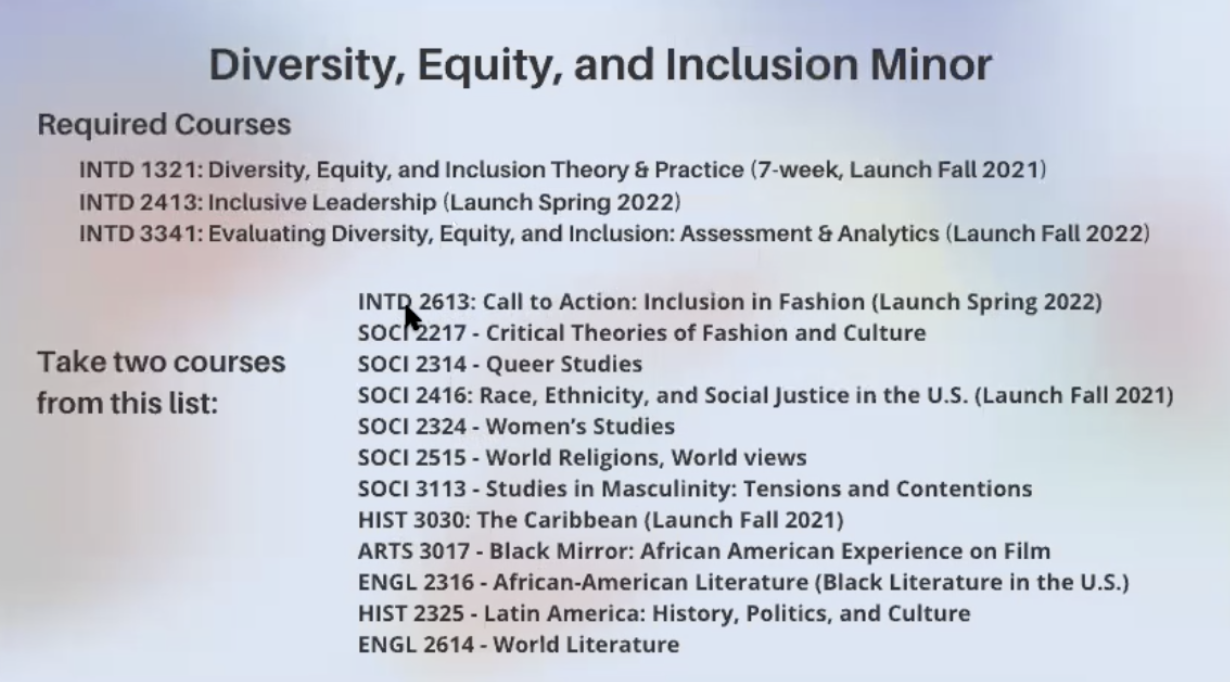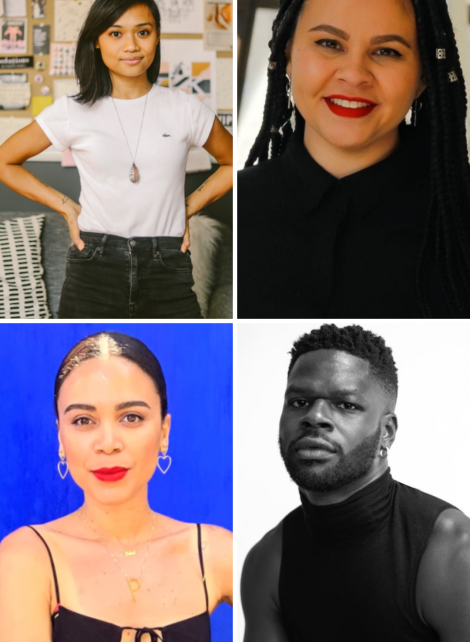Students will be able to sign up for courses in the new minor starting in the Spring 2022 semester.
Presenters shared what some of the foundational DEI courses will be.

Information about select courses follows:
Pebel Segura is the Associate Vice President of Merchandising at Ann Taylor LOFT, overseeing Tops and Lounge at the brand.
Professor Segura discussed the Inclusive Leadership course she will be teaching in Spring 2022: “In order for us to really foster an environment of growth and development, we must start with an inclusive point of view,” she says, noting that leadership does not have one definition and students will be able to explore what it means to be a leader in their own lives and in business.
Codeveloped and cotaught by LIM's Assistant Dean of Student Affairs, Erica Monnin, the course focuses on four theories:
- How are we inclusive as leaders?
- Growth mindset and what it means to foster that into leadership
- Diversity in leadership
- Equity in leadership
When joining the classroom, students can expect to have their opinions and thoughts questioned, and they can ask themselves how they can use their thoughts and ideas to optimize inclusive environments.
Dominique Norman has worked in both academia and media. Professor Norman served as a faculty member at Parsons School of Design in the School of Art and Design History and Theory, as an Academic+Career Advisor in the School of Fashion, and currently teaches a course titled Fashion, Media, and Culture at Marymount Manhattan. Professor Norman has six years of experience in digital media, including writing for Essence, V Magazine, Observer, Refinery29, HelloGiggles, Cassius, Garage Magazine, and HelloBeautiful. “My work as an educator, writer, and activist examines the intersections of race, gender, the body, sexuality, culture, media, beauty, and fashion,” they said.
On the Call to Action: Inclusion in Fashion course, Professor Norman continues: “This course is grounded in addressing the inequalities within the fashion industry and finding where the discrimination and exclusion comes from.”
Students will look at areas in fashion media and fashion brands that may be exclusive or discriminatory. This class works within a historical framework, while looking at how history connects to today’s practices within fashion. Accountability within business practices is another focus; students can look at these practices and see areas that need to be made more inclusive from a leadership level down to the consumer.
Professor Norman also discussed the Diversity, Equity, Inclusion Theory & Practice course, which allows students to learn about DEI theories and apply that framework within their personal lives, academic careers, and business endeavors. Students will have opportunity to look at case studies that focus on DEI and see how they can apply what they have learned to everyday life.
This course was created by Dr. Fiona Jaramillo, Chief of Staff at New York University School of Professional Studies.
At the event, faculty members shared the values and core teachings of their courses, and Assistant Dean of Student Affairs Erica Monnin moderated a conversation on DEI within the fashion industry, with LIM alums Bianca Caampued and Kingsley Gbadegesin.
Bianca Caampued (’07) is the cofounder and advisor to Small Girls PR, a boutique digital PR agency based in New York and Los Angeles.
In the panel discussion, Bianca described what inclusion in the workplace means to her: “As you build a company and start to form a company culture, it's important to think about ways in which you are creating programs to cultivate inclusion.”
Bianca said, “Inclusion is the culture piece.” Small Girls PR has a program that allows employees to discuss ways the company can improve inclusion. Bianca discussed how inclusion is key to making a healthy work environment. She is currently working on non-profit and social impact projects based in Tulsa, building a program for music artists that helps to form a supportive and caring environment based around artists’ financial and creative needs. Bianca is also working on a program for women reentering the workforce from the justice system that helps provide clothing, workshops, lifestyle, and family needs.
“There has been a large shift in what businesses and brands are doing and they're being held accountable by consumers, their audience and their customers,” Bianca said, adding that these ideals need to constantly be worked on and present within individuals’ lives and company culture.
Kingsley Gbadegesin (’15) is a first-generation Nigerian-American and a New York–based creator working to advance liberation for the Black community, the Queer community, and People of Color.
The Kingsley brand stemmed from Kingsley trying to help a group that was underrepresented. He notes, “I wanted to use my past and lens that I learned, and turn it on its head.” Through working with other brands throughout his career, Kingsley realized the importance of storytelling within the fashion industry.
Kingsley’s brand was born out of the Black Lives Matter movement, creating tank tops that tell a story: “Diversity, Equity and Inclusion was not something that we were looking to do but it was community-born. It was a community built from otherness.”
The brand is aspirational but tangible. Kingsley values diversity and inclusion within the Kingsley brand. He wants his costumers and anyone he works with to feel welcomed and appreciated. “You’re worthy of taking up space—you have a right.”
Advice on Diversity, Equity, and Inclusion for Students:
Bianca: “It’s about speaking up, asking questions of leadership and being proactive.” She suggests looking at different programs and methods that are working for certain companies and bringing those to the table.
Kingsley: “Find coworkers that have similar ideals as you and work together to try and implement change within the workplace. Your ideas are valid and there is a space for your ideas. You’re paving a way to make people feel seen and heard.”

A blog post by Kally Compton
Kally Compton graduated in 2023 with a Bachelor of Science in Fashion Media. In addition to being on the President's List as a student, she worked on The Lexington Line, as Editorial Director. She was also a content writer for LIM's Office of Marketing and Communications.
Related Blogs

Blog
Battling Burnout
Stay vigilant for signs of stress this spring.
- April 16, 2024
- Taisha Parkins

Blog
Tips for College Students Moving to New York City
Transitioning to the bustling energy of New York City can be a daunting, yet exhilarating, experience. For college students...
- April 4, 2024

